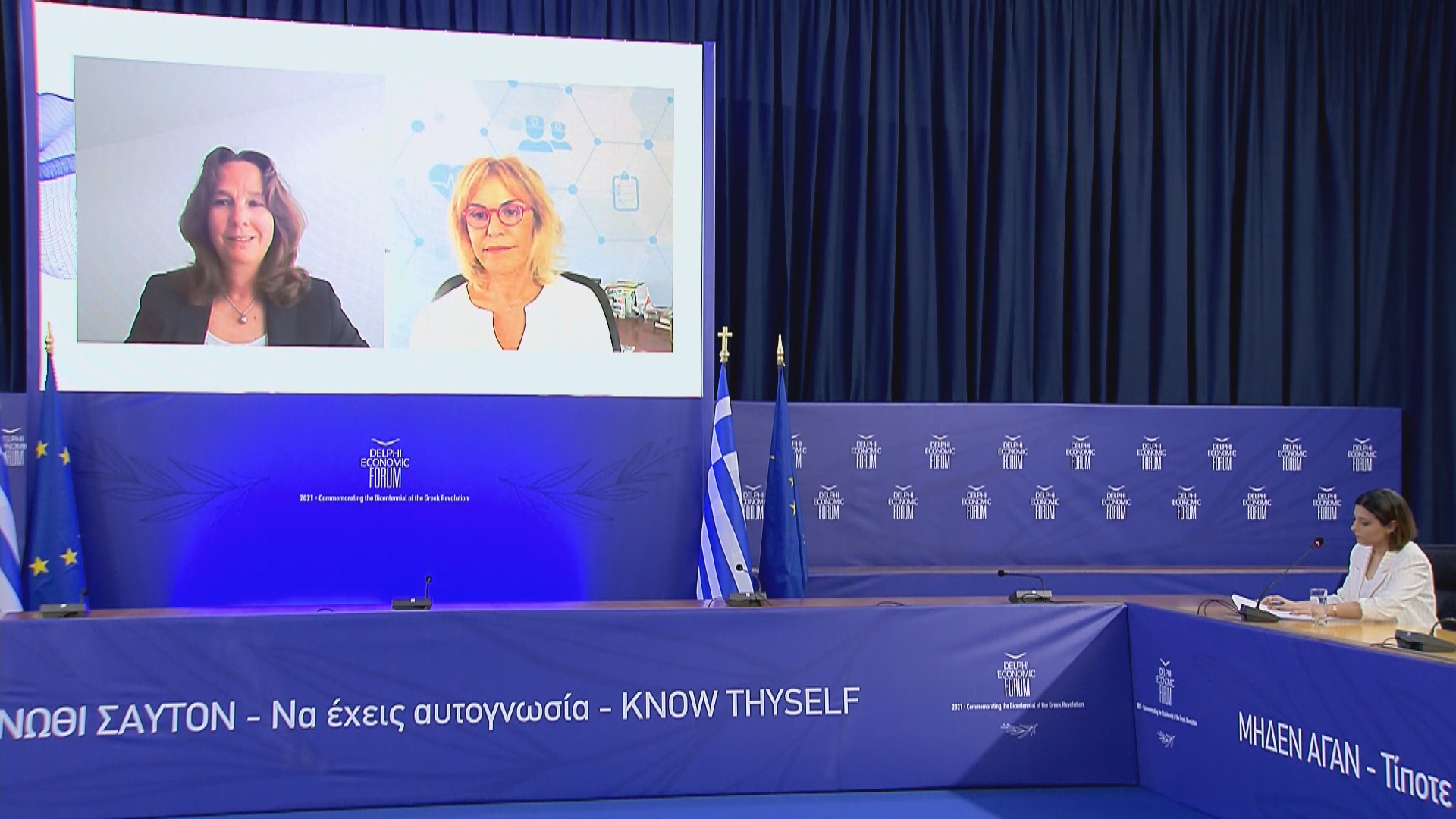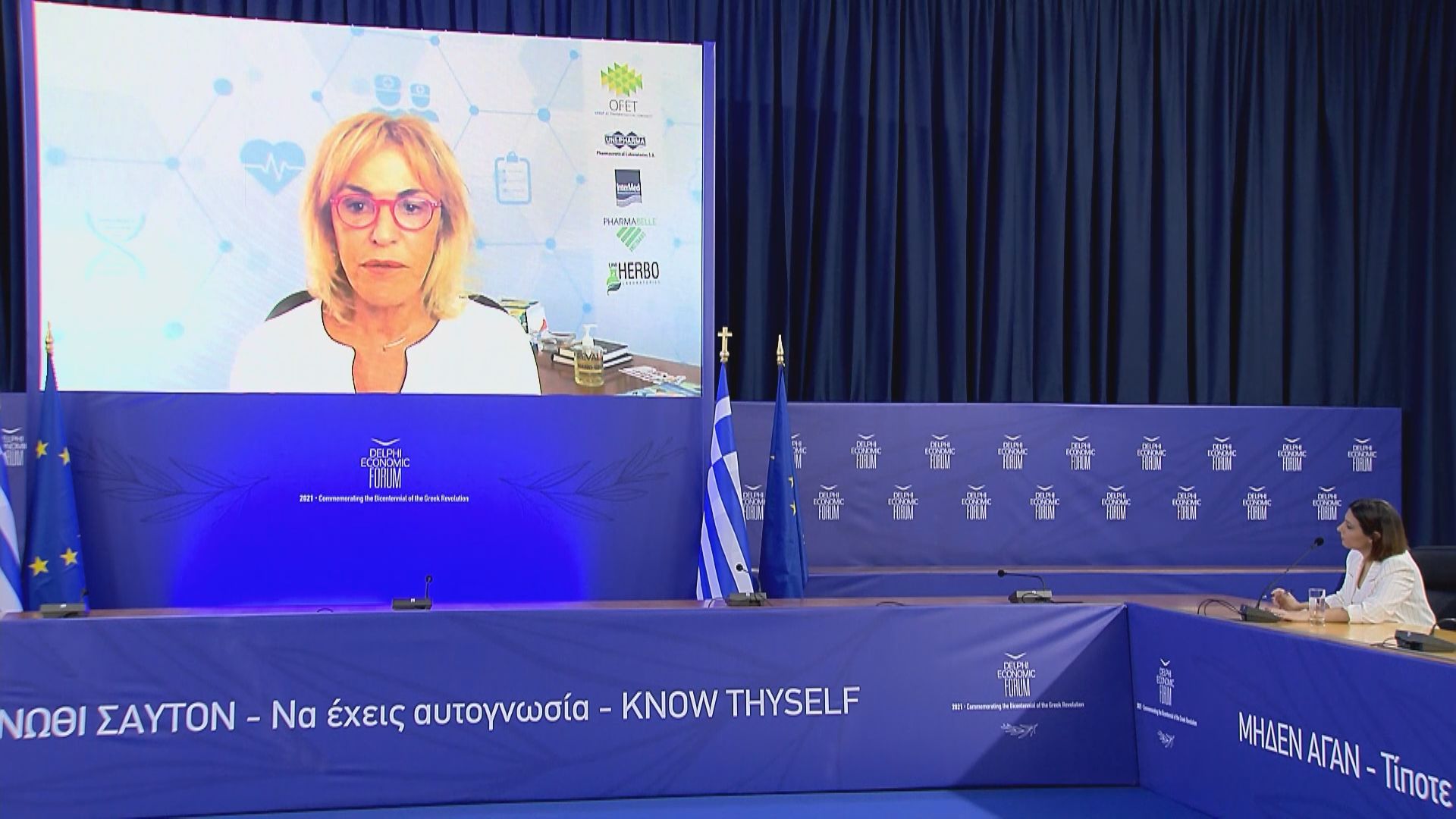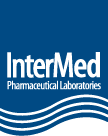Ioulia Tseti, at the Delphi Economic Forum: "A new productive model, with autonomy of raw material production, research funding & sustainable development"


Her own proposal for the next day of the pandemic COVI-19, which is linked to maintaining as many jobs as possible, but also to creating a new production model based on the autonomy of raw material production, adequate research funding and sustainable development , underlined the CEO of the Tsetis Pharmaceutical Group of Companies, member of the Board of SEV and President of the Global Compact Network Hellas, Mrs. Ioulia Tseti, at the 6th Delphi Economic Forum, which takes place from 10 to 15 May at Zappeion Megaron.
Ms. Tseti participated in a panel with other representatives of the pharmaceutical industry entitled "Health Systems of tomorrow: Pharma Policies for Growth" and had the opportunity to speak in english, both as head of a large Greek Group - consisting of the industries Uni-pharma and InterMed, the trading company in Cyprus Pharmabelle and the medicinal plant extraction industry UniHerbo- as well as with its dual institutional capacity, the member of BSE and the president of GCNH.
The statement
Every time we experience a serious crisis, of any form, we need to have the ability to transform the problem, to be able to learn from it and to move forward stronger than before.
We have learned a lot from the pandemic. It shook us and taught us to act with wisdom, responsibility, and solidarity. This serious health crisis has affected the economy, society, the labour market and of course on all our social behaviours.
It is a time for cooperation, solidarity and social cohesion/unity. The post-pandemic day requires Leaders with empathy and sensitivity, with knowledge, sobriety, and rational thinking. Leaders with a vision that inspires and transforms goals and numbers into action and prosperity.
The main goal/objective/focus of the new era and the restart of the global economy must be the preservation of jobs - millions of which have been lost in the last year - and the shift to a new productive model. A model pivoting on industrial production, sustainable development, and environmental protection.
One of the dominant issues that emerged during this crisis, is the autonomy of production, raw materials and finished products of food and medicine.
Self- sufficiency of production, adequate funding of research in producing new drugs, the cooperation among research groups, connection of production with innovation, all this should constitute the new foundations on which the pharmaceutical industry in Europe should be based. All this within a framework of new technologies, telemedicine and digital reform, where our country has proved that it has strong reflexes and capabilities. It is our duty to give space and opportunities again to domestic production, so that it can flourish. In previous years, the deindustrialisation of Europe and Greece cost us dearly in terms of jobs and growth.
Along with the Digital Revolution, a second astonishing Revolution is already on the way: that of Biotechnology. If solidarity and collaboration among researchers around the world had been greater, we would have seen more spectacular results in relation to innovative therapies, and we would have we would have gone back to normal faster.
This Biotechnology Revolution, with the participation of researchers from around the globe will very soon create innovative therapies that will contribute to the treatment of future epidemics and chronic diseases. Challenges should not frighten us. On the contrary, they should make us stronger. The future belongs to those with imagination to shape it!
The follow-up question according to Mrs Merkel's statement
Mrs Tseti you talked about the self-sufficiency of production. On April 24th at a conference of EU conservative parties Chancellor Merkel criticized the European strategy towards the pharmaceutical industry saying, and I quote, “for many years, we have not treated our pharmaceutical industry in Europe so very well. We have had outflows to America. And the United States of America has probably the strongest pharmaceutical industry, at least in the Western world”. Even though she acknowledged the importance of the European facilities in countries such as Belgium, Holland, Germany, France, Spain, her statement seems to hint at the need for a different way forward for the pharmaceutical industry in the EU. Could you comment on that and what do you think the “next day” in European pharma should look like? Where should the focus be?
Mrs Agouridis, the reason for our self-criticism is Mrs Merkel's statement.
Why has the European Union failed to support a dynamic and life saving industry, such as the pharmaceutical industry?
The de-industrial-isation of Europe in the ‘70s, did not take place overnight, it took place gradually, due to high costs of raw material, high wages, but also due to the demands of the trade unions, as well as for environmental reasons. Manufacturing plants were transferred outside Europe, along with technology and know-how. Today with this pandemic the consequences are obvious. We suffer from deficits and raw material shortage.
It is self-evident that when basic production of food and medicine is affected, citizens and society are directly affected, as well.
In my opinion, we can gain time by investing in innovation and research and by supporting the enhancement of production in Europe. Of course we should do this while taking environmental and sustainability issues very seriously. In order to strengthen a robust industry in Europe we should rationalise taxes and relate them to innovation and growth.
We should reinvent the value of working in production. We should re-approach the working force and make working in industrial production attractive again. We should reward industrial profit and the people who work there.
We need to make sure that mistakes such as the one with BioTech will not be repeated. BioTech researchers received European money to develop their product, and then they ended up selling their innovation to the States.
The pandemic - as painful as it is - has given us an opportunity to wake up and realize that in the future we need to be more cooperative, to act with solidarity and turn to the BIG PHARMA model, making the most of technology, telemedicine, and the potential that digital revolution gives us.
In Europe it is fundamental that everybody has the same right to health and education. Social health insurance for all is a core value in Europe. With this pandemic, we can now see what this means. In order for someone to be safe, no matter how much money he or she has, everybody needs to be safe.
As a member of Foard of Directors of SEV, I would like to tell you that there is an insuperable need to strengthen the Greek production, to make Greece a hub of Innovation and Excellence and to "embrace" digital platforms more vigorously. After all, the favorable financial environment of the Recovery Fund (RF), gives us this opportunity, and we must use it wisely.
As President of the Global Compact Network Hellas, I firmly believe that all the above make sense only if we embrace the 10 principles and 17 sustainable goals of the UN.
The challenges will never stop, we may be experiencing the challenge of Covid 19 today, but it is certain that other crises await us in the future. Only with social cohesion and solidarity, will we be able to deal with these future challenges!
